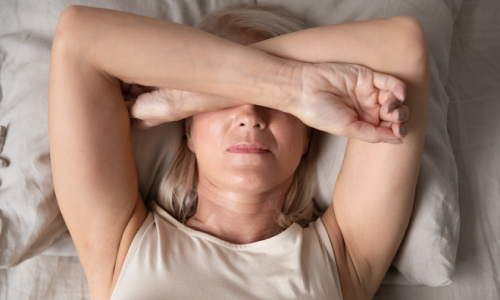Hot flashes and the menopause | What are hot flashes and what can I do about them?
- Overview
What is a hot flash?
A hot flash typically feels like heat is suddenly being pressed against your skin. This feeling of warmth can come on without warning during the menopause and perimenopause.
You can get a hot flash at any time and the most commonly affected area is the face and skin of the upper body.
What does a hot flash feel like?
Hot flash symptoms can vary from person to person. During a hot flash you may experience:
- a warm tingling feeling in your skin
- a hot feeling in your face
- sweating
- increased heartbeat
- anxiety
- blotchy skin.
Is it hot flashes or hot flushes?
The two terms are used interchangeably and refer to the same set of symptoms.
What causes hot flashes?
Hot flashes are still not fully understood in the medical world. It’s thought that they occur because of hormonal changes and a decrease in oestrogen levels during middle age.
As oestrogen levels fluctuate, our temperature-regulating mechanisms are disrupted, causing the body to falsely perceive the presence of heat, even in colder climates.
Do all women get hot flashes?
Research suggests that around 75% of women experience hot flashes during the menopause.
If hot flashes start before the age of 40, it’s worth getting checked out by your GP, as this can be a sign of something more serious.
When do hot flashes start?
The menopause (this includes the perimenopause) typically starts when you’re between the ages of 45 and 55, meaning it’s likely that hot flashes will start during this period.
You may experience symptoms before or after this age, however symptoms are most likely to manifest in this age bracket.
How long do hot flashes last?

Hot flashes are sporadic bursts of heat that can last anywhere from a few seconds to a few minutes. It’s estimated that the average length of a hot flash is around four minutes. It is rare that a hot flash lasts longer than this.
Because we’re all different, it’s important you don’t compare yourself with other women too much. Some women experience hot flashes:
- multiple times a day
- a few times a week
- during the night
- only when exposed to triggers
- never.
Can you get hot flashes outside of the menopause?
You can, but this is rare.
Many women are curious about whether you can experience hot flashes outside of the menopause and the perimenopause.
It’s very rare that hot flashes specifically are a symptom of something other than the menopause. This is because it’s thought that hot flashes are caused by changes in our thermoregulation systems because of fluctuating oestrogen levels during the menopause and the perimenopause.
You might experience regular hot flashes outside of the menopause if you have thyroid problems, are overweight, or take specific medications.
Hot flash triggers
Hot flash triggers are different in everyone. You may even find that you don’t have any instantly recognisable triggers.
You can see some of the most common triggers in the list below:
- Hot weather
- Spicy food
- Nicotine
- Caffeine
- Alcohol
- Tight clothing
- Exercise
- Sudden changes in temperature
- Hot drinks
- Stress.
Is there a cure for hot flashes?
Unfortunately there is no “cure” for hot flashes.
What you can do to lessen their impact is make sensible lifestyle adjustments so your body is better positioned to deal with the symptoms.
Some women choose to undergo a course of treatment where their oestrogen is supplemented. This treatment is explored in more detail below.
How to manage hot flashes

Treating hot flashes naturally involves making changes to your lifestyle. This includes management techniques that can reduce the frequency and intensity of hot flashes.
Because hot flashes aren’t fully understood, maintaining a healthy lifestyle is the number one recommendation for minimising hot flashes.
- Keep cool – even small increases to your body temperature can induce a hot flash
- Wear loose clothing – a common trigger for a hot flash is feeling restricted
- Quit smoking – smoking is linked with severe hot flashes, as well as serious health conditions
- Cooler showers – this can help if you sweat and get morning flashes whilst getting dressed
- Avoid spicy food – hot and spicy food is a common trigger for many women
- Lose weight – losing weight can help lower the severity of hot flashes
- Exercise regularly – getting active has widespread benefits for your overall health.
Diet and why it’s so important
Eating foods rich in vitamins, minerals, and nutrients helps your body combat all sorts of infections and viruses. The same rule applies when thinking about minimising symptoms of certain conditions and ailments.
If your body is being given healthy protein, fruits, and vegetables, it’s going to be in a better position to deal with hot flashes.
If you currently experience hot flashes and are interested in how cleaning up your diet can help, consider visiting a dietician or discussing this with your GP.
- Looking for nutrition advice? Click here to learn more
Eating phytoestrogens
Studies indicate that foods high in phytoestrogens may mimic the actions of oestrogen, elevating its presence in the body to help combat some of the side effects of the menopause and perimenopause. These include:

- soya
- tofu
- tempeh
- soy milk
- legumes
- fruits
- vegetables
- nuts
- edamame
- flaxseeds
- sesame seeds
- tahini
- whole grains
- barley and wheat
- nuts
Hormone replacement therapy
Hormone replacement therapy (HRT) is a treatment for menopausal women. It involves taking a combination of oestrogen and progesterone (for women with a uterus) or oestrogen alone (for those without a uterus) to replace these declining hormones.
HRT can effectively alleviate hot flashes, mood swings, and vaginal dryness. It also helps maintain bone density and may reduce the risk of osteoporosis and colorectal cancer.
Hormone therapy is not without its risks. These include an increased risk of breast cancer, blood clots, and stroke. Women considering HRT should discuss the benefits and risks with their GP to make an informed decision about whether or not the treatment is right for them.
Oestrogen supplements for hot flashes
Oestrogen supplements contain synthetic or naturally derived oestrogen. They are often prescribed to address hormonal imbalances, manage symptoms of menopause and the perimenopause, or treat certain medical conditions and are available in the form of pills, patches, creams, and injections.
The side effects are similar to HRT. If you are considering taking any form of oestrogen supplementation, you should first discuss safety and impact with your GP.
When to see your doctor
If you’re having severe hot flashes, you can discuss this with your GP. They may take blood to rule out any other issues and will be able to make helpful lifestyle suggestions to help minimise the severity of your symptoms.
Last updated Friday 27 October 2023
First published on Wednesday 18 October 2023

